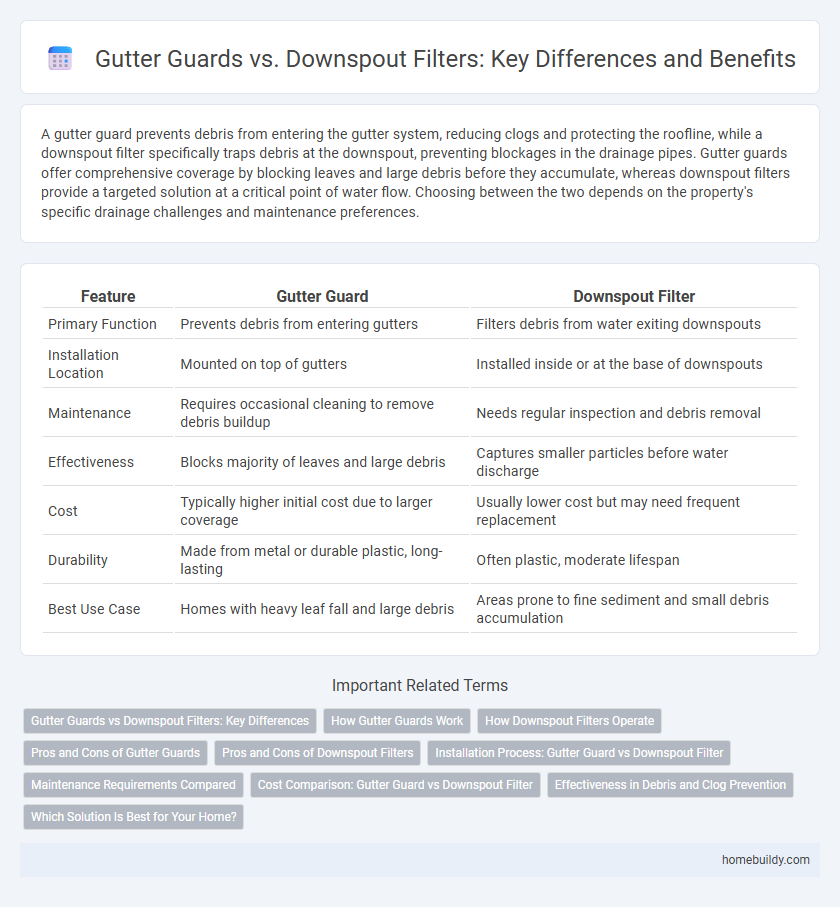A gutter guard prevents debris from entering the gutter system, reducing clogs and protecting the roofline, while a downspout filter specifically traps debris at the downspout, preventing blockages in the drainage pipes. Gutter guards offer comprehensive coverage by blocking leaves and large debris before they accumulate, whereas downspout filters provide a targeted solution at a critical point of water flow. Choosing between the two depends on the property's specific drainage challenges and maintenance preferences.
Table of Comparison
| Feature | Gutter Guard | Downspout Filter |
|---|---|---|
| Primary Function | Prevents debris from entering gutters | Filters debris from water exiting downspouts |
| Installation Location | Mounted on top of gutters | Installed inside or at the base of downspouts |
| Maintenance | Requires occasional cleaning to remove debris buildup | Needs regular inspection and debris removal |
| Effectiveness | Blocks majority of leaves and large debris | Captures smaller particles before water discharge |
| Cost | Typically higher initial cost due to larger coverage | Usually lower cost but may need frequent replacement |
| Durability | Made from metal or durable plastic, long-lasting | Often plastic, moderate lifespan |
| Best Use Case | Homes with heavy leaf fall and large debris | Areas prone to fine sediment and small debris accumulation |
Gutter Guards vs Downspout Filters: Key Differences
Gutter guards primarily prevent debris such as leaves and twigs from entering the gutter system, reducing clogging and maintenance needs. Downspout filters are installed at the downspout level, capturing smaller debris and preventing blockages further down the drainage path. The main difference lies in their placement and the type of debris they filter, with gutter guards offering broad surface protection and downspout filters providing secondary filtration.
How Gutter Guards Work
Gutter guards prevent debris from entering the gutter system by creating a barrier using mesh, screens, or foam inserts, allowing water to flow through while blocking leaves and twigs. They reduce clogs and minimize maintenance by directing rainwater efficiently into downspouts. Unlike downspout filters, which catch debris at a specific point, gutter guards protect the entire gutter surface, enhancing overall water drainage and preventing overflow.
How Downspout Filters Operate
Downspout filters operate by capturing debris as water flows through the downspout, preventing clogs downstream and ensuring efficient water drainage. These filters typically use a mesh or screen to trap leaves and larger particles, allowing only clean water to pass through the drainage system. Properly maintained downspout filters reduce the risk of water damage and extend the lifespan of gutters by minimizing blockages.
Pros and Cons of Gutter Guards
Gutter guards offer effective protection by preventing leaves and debris from entering gutters, reducing the need for frequent cleaning and lowering the risk of water damage caused by clogged gutters. They often provide better coverage compared to downspout filters, which only protect the downspout area and can still allow debris buildup in the gutters themselves. However, gutter guards can be more expensive to install and may require professional maintenance, whereas downspout filters are usually cheaper and easier to replace.
Pros and Cons of Downspout Filters
Downspout filters effectively prevent large debris such as leaves and twigs from clogging gutters and drainage systems, reducing maintenance frequency. However, they can become obstructed easily due to their smaller surface area compared to gutter guards, leading to potential overflow during heavy rain. Installation and cleaning of downspout filters can be more labor-intensive, making them less convenient for long-term, low-maintenance solutions.
Installation Process: Gutter Guard vs Downspout Filter
Gutter guard installation involves attaching protective covers or screens directly over the gutters to prevent debris accumulation, typically requiring minimal tools and basic ladder work. Downspout filters are installed at the pipe's entry or exit points, demanding precise cutting and fitting for secure attachment, often involving more complex plumbing adjustments. Both methods aim to enhance water flow efficiency but differ significantly in installation complexity and hardware requirements.
Maintenance Requirements Compared
Gutter guards require regular inspection and occasional cleaning to remove debris buildup, preventing clogs and water damage. Downspout filters demand more frequent maintenance due to their smaller size and higher likelihood of clogging with leaves and dirt. Both systems help maintain proper water flow, but gutter guards generally offer lower maintenance needs compared to downspout filters.
Cost Comparison: Gutter Guard vs Downspout Filter
Gutter guards typically range from $7 to $15 per linear foot for materials and installation, offering a long-term solution for debris prevention. Downspout filters are generally less expensive upfront, averaging $20 to $50 per unit, but may require frequent cleaning and replacement, increasing maintenance costs. Over time, gutter guards provide better cost efficiency by reducing debris buildup and minimizing the need for regular downspout filter replacements.
Effectiveness in Debris and Clog Prevention
Gutter guards provide comprehensive coverage that prevents large debris such as leaves and twigs from entering the gutter system, significantly reducing the risk of clogs. Downspout filters, however, primarily block smaller debris at the downspout level, which means debris can still accumulate in gutters before reaching the filter. For maximum effectiveness in debris and clog prevention, gutter guards are preferable as they stop debris at the source, enhancing water flow and reducing maintenance frequency.
Which Solution Is Best for Your Home?
Gutter guards provide comprehensive protection by preventing debris from clogging gutters, ensuring efficient water flow and reducing maintenance needs. Downspout filters target debris at the exit point of water flow, offering localized filtration but requiring more frequent cleaning to avoid blockages. Choosing the best solution depends on your home's roof size, surrounding foliage, and maintenance preference, with gutter guards favored for full-system defense and downspout filters suited for targeted debris control.
Gutter guard vs downspout filter Infographic

 homebuildy.com
homebuildy.com